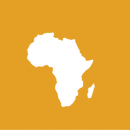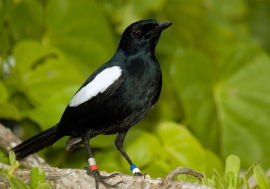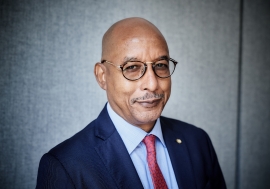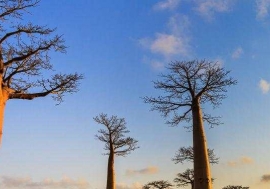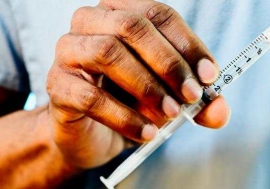Africa calls for a ‘new impetus’
Africa calls for a ‘new impetus’
On 22 September, the UN General Assembly held a special high-level meeting devoted exclusively to Africa’s development needs. It featured the participation of 29 heads of state and government, along with other representatives of African, developing and donor countries, bilateral and multilateral agencies and business and civil society organizations. The meeting’s final declaration included a reaffirmation by donor countries to increase their development assistance and other forms of support for Africa’s efforts (see Africa Renewal, October 2008). Here we provide excerpts from several of the key addresses.
Jakaya Kikwete, chairperson of the African Union (AU), president of the United Republic of Tanzania
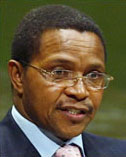 Photograph: UN / Marco Castro
Photograph: UN / Marco Castro
Jakaya Kikwete: “We are determined to wrestle ourselves out of our predicament.”
The list of Africa’s development needs is long, from provision of basic social and economic services to ensuring food security and increasing people’s incomes through transformation of the productive sectors.... Unfortunately, because of its lower level of development, Africa does not have sufficient resources to pull itself out of the poverty trap....
One good thing about those facts is that all of us in the international community and on the continent recognize Africa’s acute resource constraints. We also know that African governments have been taking measures to tackle the development challenges using the few resources available to them. Another good thing is the fact that the international community has been generous enough to assist African nations with resources to complement their efforts. Unfortunately, the resources being committed and made available are not sufficient to lift Africa out of the poverty trap quickly.
I would like to take this opportunity to express Africa’s disappointment at the failure of the developed nations to honour their commitments to provide resources to deal with the challenges of Africa’s development. Allow me to use this forum today to call for a new impetus in meeting those commitments. It is the historic duty and a moral obligation of the developed nations to help the needy in Africa; it is not a question of charity....
Africa is not a hopeless case. We are not desperate, nor have we resigned ourselves to a state of helplessness. We are determined to wrestle ourselves out of our predicament. All we are saying is that we need the support of the developed members of the international community to complement our efforts. We thank our development partners for the invaluable support extended to us over many years, but much more needs to be done. That is all we are asking. It can be done; let us all play our part.
Miguel d’Escoto, president of the General Assembly
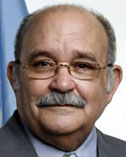 Photograph: UN / Mark Garten
Photograph: UN / Mark Garten
Miguel d’Escoto: “I call upon the world’s rich countries to redouble their efforts.”
Africa has undeniably made considerable democratic advances with the holding of elections and the establishment of elected governments all across that fair continent. I would especially like to welcome the establishment of the African Union in 2000 and the launching of the New Partnership for Africa’s Development [NEPAD], which were undoubtedly milestones in Africa’s history and in the empowerment of its own political, economic and social development process.
Africa’s challenges are indeed still enormous. Brave as its nations may be — and we know that they are — Africa cannot move ahead on its own. The African countries’ gains in terms of economic growth are real, but they must be decisively strengthened through concrete actions, such as the provision of more substantial external debt relief. The relative progress made in that area cannot obscure the unfair conditionalities that the Bretton Woods institutions and creditor countries continue to impose. Those conditionalities have the perverse effect not only of preventing the effective implementation of poverty-reduction programmes, but also of eroding the living conditions of tens of millions of people, driving them deeper into the poverty from which those institutions were supposed to save them....
I therefore call upon the world’s rich countries to redouble their efforts to bring official development assistance — which dropped from 0.33 per cent of gross domestic product in 2005 to 0.28 per cent in 2007 — closer to the [2002] Monterrey commitment of 0.7 per cent. I wish to remind members that that goal was first proposed by the Assembly itself in 1970. In the same vein, given the current levels of disbursement, I ask the members of the Group of Eight, with all the force of my position as president of the General Assembly, to deliver on the pledge they made at Gleneagles in 2005 to double official development assistance for Africa by 2010.
Nicolas Sarkozy, president of France
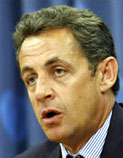 Photograph: UN / Mark Garten
Photograph: UN / Mark Garten
Nicolas Sarkozy:“We Europeans know that development assistance to Africa is first and foremost an investment in our common future.”
Africa is on the move once again. The continent has found its way back to the path of growth. Since 1994, its average annual growth has been nearly 5 per cent.... However, that economic growth remains very abstract for a majority of Africans. A statistical reality, it is not yet an everyday reality for Africa’s populations. Indeed, the African continent faces many challenges, including the food crisis and the effects of climate change.
Europe wants to be involved alongside [Africa].... But let this be quite clear: The aid that Europe has agreed on for Africa is not simply from the heart; it is entirely rational, because we Europeans know that development assistance to Africa is first and foremost an investment in our common future. The globalized world needs a developed Africa. The European Union, a direct neighbour of the continent of Africa, needs a developed Africa.
What would be the use of working towards security and stability for Europe without at the same time seeking to bridge the existing development gap between Europe and Africa? It would be a delusion to envisage Europe’s prosperity without working at the same time for the emergence of a major economic partner, located 14 kilometres from the European coast, whose population in 2030 will be greater than that of India or China. It is a delusion to seek world food security without making the most of Africa’s agricultural resources so that it can feed itself, first and foremost, but also help to feed the world.
Jean Ping, chairman, African Union Commission
 Photograph: UN / Mark Garten
Photograph: UN / Mark GartenWe Africans are primarily responsible for Africa’s development. Carrying out the agenda for Africa is first and foremost up to us. We intend to take full responsibility for it. It is that very spirit of ownership that led African leaders to establish the New Partnership for Africa’s Development (NEPAD). The African Union is resolutely implementing that initiative, for which it has established a funding strategy and identified specific projects. NEPAD and the African Peer Review Mechanism reflect the continent’s desire to take control of its own destiny....
We all know that political stability on the continent would facilitate the mobilization of the resources needed in our tireless fight against poverty. We all know that peace and security are necessary for sustainable development. The African Union has not hesitated to move ahead with the establishment of its peace and security structures....
At a time when general mobilization is needed to meet new challenges such as the food crisis, the energy crisis, climate change, the digital divide and others, we need to stand together, overcome our differences and emphasize dialogue and the sharing of responsibilities, skills, successes, benefits and, above all, the satisfaction of having fulfilled our duty and nobly served our peoples.
Yoweri Museveni, president of Uganda
 Photograph: UN / Mark Garten
Photograph: UN / Mark GartenIn the 1960s Africa missed the boat because of two mistakes, in my opinion. Mistake number one was some anti-private-sector attitudes by some of the governments — that was one problem. Second problem was the failure to go for export-oriented growth. Some of the countries were engaged in what they used to call import substitution, and yet the African economies are small, so if you only aim at positioning for the internal market, you are not going to go very far.
By the time we woke up and changed to private sector-led growth, the economies of Eastern Europe had been opened up. The big economies of China, the big economies of India had been opened up and they have attracted more investments than our own small markets. We are now doing the right thing by encouraging regional integration. This is good. This is a real answer.
Marc Ravalomanana, president of Madagascar
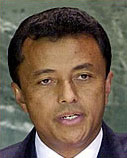 Photograph: UN / Michelle Poire
Photograph: UN / Michelle PoireWe need an agricultural revolution across Africa, one that will significantly boost farm productivity and incomes for the poor, while safeguarding the environment, one that will help millions of small-scale farmers lift themselves out of poverty and hunger.... The UN together with other donors should increase the provision of financial resources and technical expertise to all our countries to speed up and support this agricultural revolution....
Besides finances, the lack of capacity is the main hurdle in the way of our development. This stresses the importance of education.... We should reinforce and enhance our efforts to reverse the brain drain and to stem the outward flow of skilled professionals from developing countries.... We need to help motivate these women and men to dedicate their talents to the development of their home countries.

